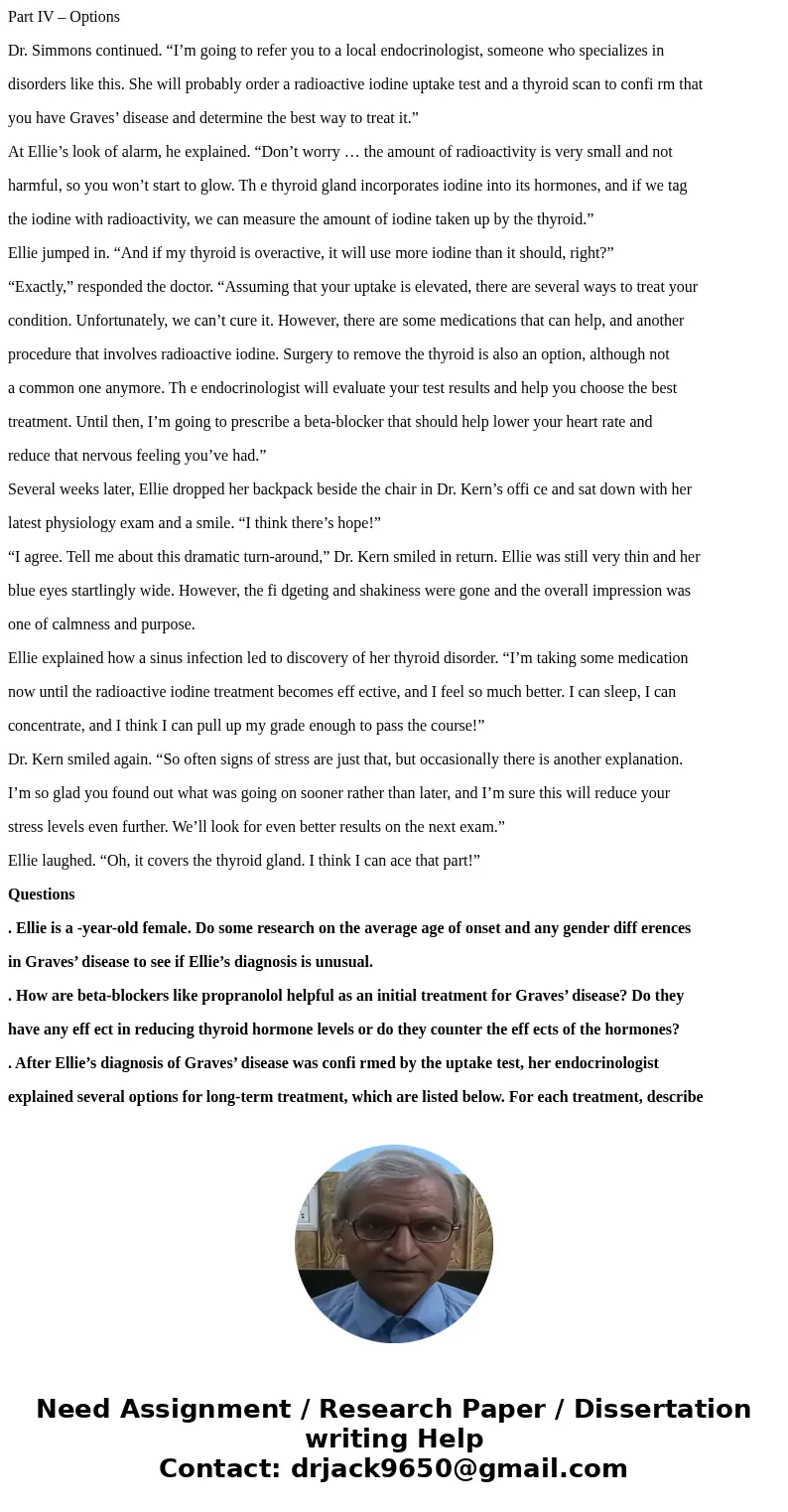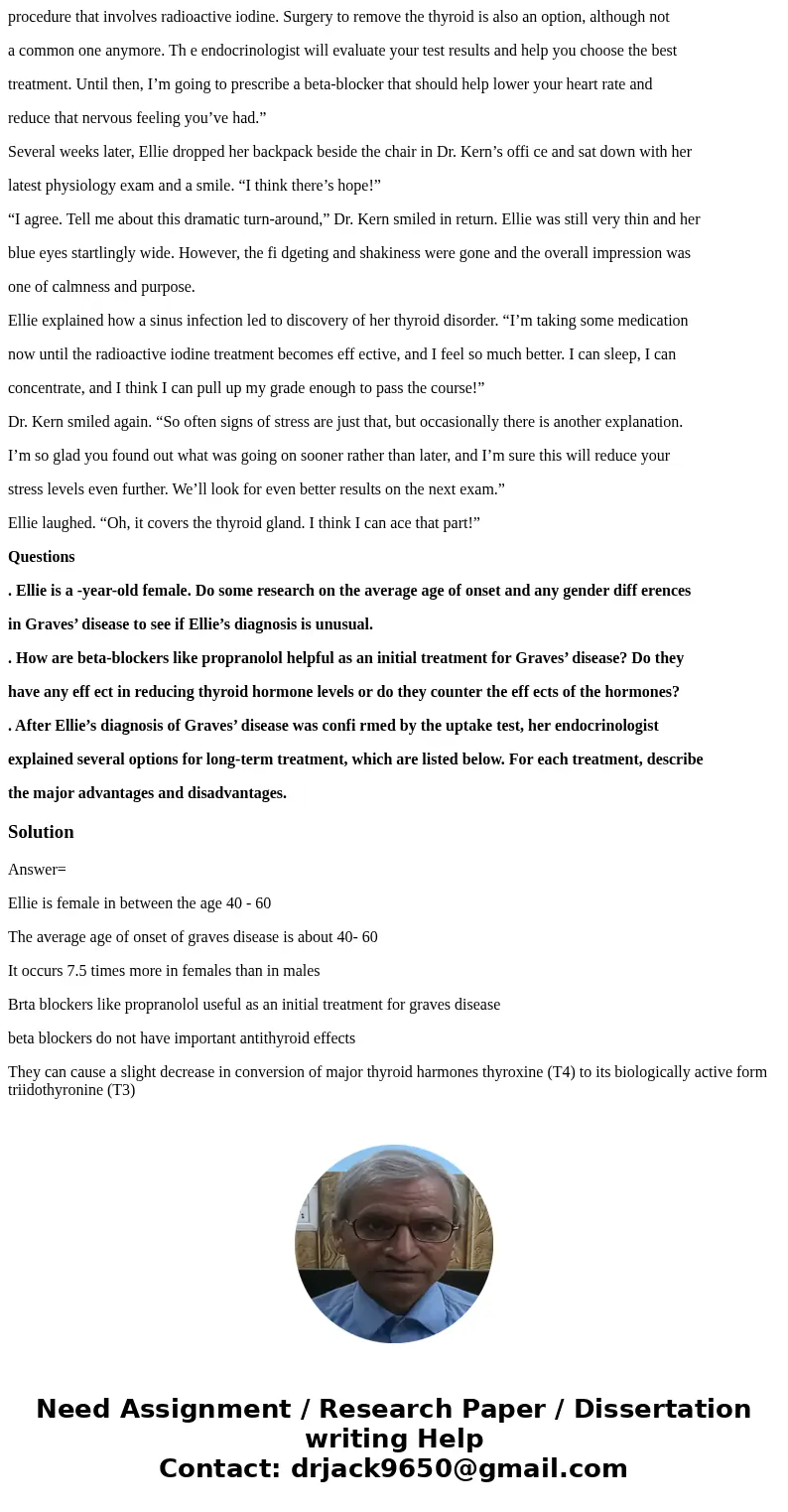Part IV Options Dr Simmons continued Im going to refer you
Part IV – Options
Dr. Simmons continued. “I’m going to refer you to a local endocrinologist, someone who specializes in
disorders like this. She will probably order a radioactive iodine uptake test and a thyroid scan to confi rm that
you have Graves’ disease and determine the best way to treat it.”
At Ellie’s look of alarm, he explained. “Don’t worry … the amount of radioactivity is very small and not
harmful, so you won’t start to glow. Th e thyroid gland incorporates iodine into its hormones, and if we tag
the iodine with radioactivity, we can measure the amount of iodine taken up by the thyroid.”
Ellie jumped in. “And if my thyroid is overactive, it will use more iodine than it should, right?”
“Exactly,” responded the doctor. “Assuming that your uptake is elevated, there are several ways to treat your
condition. Unfortunately, we can’t cure it. However, there are some medications that can help, and another
procedure that involves radioactive iodine. Surgery to remove the thyroid is also an option, although not
a common one anymore. Th e endocrinologist will evaluate your test results and help you choose the best
treatment. Until then, I’m going to prescribe a beta-blocker that should help lower your heart rate and
reduce that nervous feeling you’ve had.”
Several weeks later, Ellie dropped her backpack beside the chair in Dr. Kern’s offi ce and sat down with her
latest physiology exam and a smile. “I think there’s hope!”
“I agree. Tell me about this dramatic turn-around,” Dr. Kern smiled in return. Ellie was still very thin and her
blue eyes startlingly wide. However, the fi dgeting and shakiness were gone and the overall impression was
one of calmness and purpose.
Ellie explained how a sinus infection led to discovery of her thyroid disorder. “I’m taking some medication
now until the radioactive iodine treatment becomes eff ective, and I feel so much better. I can sleep, I can
concentrate, and I think I can pull up my grade enough to pass the course!”
Dr. Kern smiled again. “So often signs of stress are just that, but occasionally there is another explanation.
I’m so glad you found out what was going on sooner rather than later, and I’m sure this will reduce your
stress levels even further. We’ll look for even better results on the next exam.”
Ellie laughed. “Oh, it covers the thyroid gland. I think I can ace that part!”
Questions
. Ellie is a -year-old female. Do some research on the average age of onset and any gender diff erences
in Graves’ disease to see if Ellie’s diagnosis is unusual.
. How are beta-blockers like propranolol helpful as an initial treatment for Graves’ disease? Do they
have any eff ect in reducing thyroid hormone levels or do they counter the eff ects of the hormones?
. After Ellie’s diagnosis of Graves’ disease was confi rmed by the uptake test, her endocrinologist
explained several options for long-term treatment, which are listed below. For each treatment, describe
the major advantages and disadvantages.
Solution
Answer=
Ellie is female in between the age 40 - 60
The average age of onset of graves disease is about 40- 60
It occurs 7.5 times more in females than in males
Brta blockers like propranolol useful as an initial treatment for graves disease
beta blockers do not have important antithyroid effects
They can cause a slight decrease in conversion of major thyroid harmones thyroxine (T4) to its biologically active form triidothyronine (T3)


 Homework Sourse
Homework Sourse